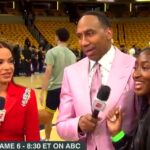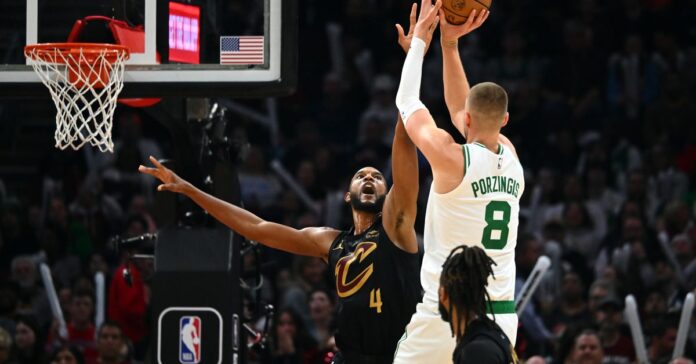After a bit of well-earned rest in the wake of their first round dismantling of the Miami Heat, the Boston Celtics know their second round opponent: the Cleveland Cavaliers, fresh off their first playoff series win since LeBron James left town for the second time. With a record of 48-34, the Cavaliers earned the fourth seed in the Eastern Conference and battled their way through an ugly seven-round series against the Orlando Magic. Now they get their crack at the league’s best team.
It’s not a matchup that necessarily forecasts a lot of drama. The Cavaliers have talent, to be sure, but for the second straight season, they’ve seemed to add up to less than the sum of their parts. After an ignominious end last April at the hands of the New York Knicks, Cleveland didn’t exactly light the world on fire against Orlando. It was a slugfest, a defense-dominated affair that saw the two teams crack triple-digit scoring just six times in seven games.
At the core of all Cleveland’s questions sits Evan Mobley. The erstwhile #3 overall pick has helped drive their defensive success, while weighing down their offense in the process. Mobley is a conundrum that the Cavaliers have not yet solved, and his performance in the second round of the playoffs looks to be incredibly consequential in how the series could play out.
:no_upscale()/cdn.vox-cdn.com/uploads/chorus_asset/file/25436618/2120463604.jpg)
Photo by Jason Miller/Getty Images
You’d be forgiven if you thought Mobley’s third season looked not altogether dissimilar from his first. After averaging 15 points, 8.3 rebounds, 2.5 assists, 0.8 steals and 1.7 blocks as a rookie, he recorded a near-identical 15.7 points, 9.4 rebounds, 3.2 assists, 0.9 steals and 1.4 blocks this year. In terms of net rating, he recorded a +1.7 mark as a rookie and a +1.2 this year (sandwiching a much healthier +6.5 mark as a sophomore).
Counting stats don’t tell you everything, of course, and Mobley hasn’t been completely stagnant in the NBA. He’s grown steadily more efficient inside the arc, scoring a career-best 60.4% of his attempts inside the arc this season, and he’s become a more comfortable and willing passer to boot.
Defense remains his calling card, and he’s a genuine game-changer on that end of the floor. Had he not fallen well short of the NBA’s new 65-game requirement for awards recognition, he would have at least merited consideration for a selection on an All-Defense team.
In the final three games of the Orlando series, with Allen sidelined, Mobley played some of his best basketball. He outworked the jumbo-sized Magic on the glass, grabbing 35 rebounds (11 offensive) in three games, and stymied them at the rim defensively with twelve blocked shots. After recording a plus-minus of -38 in Cleveland’s consecutive losses in Orlando in Games 3 and 4, he was a +8 across the final three games of the series. This wasn’t a star turn from the 22-year-old, but it was assertive, winning basketball.
:no_upscale()/cdn.vox-cdn.com/uploads/chorus_asset/file/25436623/2151593209.jpg)
Photo by Jason Miller/Getty Images
Questions about his offense and, subsequently, his role, still remain. His shooting ability hasn’t meaningfully developed. He shot 37.3% from three-point range this season (a career-high), but that number is a bit of a misnomer — he put up just 1.2 three-point attempts per game this season. It’s a rough time to be a nominal power forward in the NBA that can’t shoot, let alone one that won’t shoot.
If Mobley could play the five with regularity, this would be a non-issue. For that reason, though, the potential absence of Jarrett Allen sends us into even murkier waters. With the duo of Rudy Gobert and Karl-Anthony Towns thriving out west this year, Allen and Mobley have taken their place as the foremost frontcourt odd couple in the NBA. The complexion of the Cavaliers changes dramatically depending on which of the two are available, and how coach J.B. Bickerstaff manages the pair will be incredibly consequential.
With both bigs available, Cleveland sits in something of a lineup no man’s land. Each player is a better fit playing the five, and unlike pairings like Gobert and Towns or Kristaps Porzingis and Al Horford, neither alleviates the spacing concerns the arrangement creates by stretching the floor with elite shooting. For the year, Allen and Mobley have recorded a 0.9 net rating in 768 regular season minutes, which has dropped to -3.1 in a small sample of 80 minutes so far this postseason.
Mobley feels like the chief offender behind this underperformance. Allen is a limited player, yes, but he has a clear, specific role and plays like a star within it. He’s a sturdy rim protector and an efficient presence in the paint offensively. For Mobley’s part, he remains significantly more undefined. He defends effectively — the Cavs are at their best on that end with the center duo playing together — but he takes away much of that value on the other end of the court.
PBPStats paints a strong picture of Cleveland’s conundrum.
:no_upscale()/cdn.vox-cdn.com/uploads/chorus_asset/file/25436568/mobleyallen.PNG)
The chart illustrates the problem and one of its key causes. The Cavaliers are best when Allen takes the floor alone, and they get anchored down when Mobley takes the court. The three percent drop in their three-point shooting with both bigs on the court tells the story — the Cavs offense revs its engines when Bickerstaff goes to a single big look, trading a non-shooter for an additional three-point threat to complement Mitchell. Cleveland is quietly loaded with high-level shooters — Max Strus, Sam Merrill, Dean Wade, Georges Niang, and Isaac Okoro. Putting three of them on the court alongside Mitchell and Allen has been their secret sauce.
In short, the Cavaliers have constructed a roster that can’t maximize two of its four best players together. It’s a potentially fatal flaw for an otherwise highly talented roster. It’s no coincidence that Cleveland’s best stretch of the regular season — a 22-4 run from mid-December through early February — came with Mobley sidelined or playing reduced minutes.
We know what Donovan Mitchell is going to bring to this series. He’s a superstar scoring guard and a battle-tested playoff performer who just iced a team by scoring 89 points across the final two games of the series. He’s absolutely capable of putting Cleveland on his back and stealing a game off of the Celtics — maybe even two.
If this series is going to be any more competitive, though, the Cavaliers need Evan Mobley to finally self-actualize. The Celtics have the tools to make Mitchell’s life difficult — seldom a minute is going to pass in this series where one of Derrick White or Jrue Holiday isn’t shadowing his steps. With Porzingis likely absent for much, if not all, of the series, Boston needs to be mindful of their weakness in the frontcourt. Preventing the third-year center from making his overdue star turn will go a long way towards advancing to the Eastern Conference Finals as swiftly as possible.





















